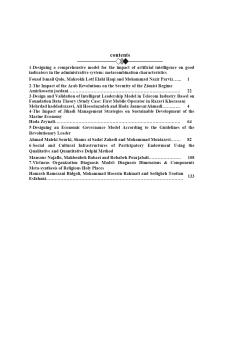Designing an Economic Governance Model According to the Guidelines of the Revolutionary Leader
Subject Areas : Jihadi managementAhmad Maleki Sourki 1 * , Shams al Sadat Zahedi 2 , Mohammad Montazeri 3
1 - PhD Student, Department of Management, Sirjan Branch, Islamic Azad University, Sirjan, Iran
2 - Professor, Department of Management, Sirjan Branch, Islamic Azad University, Sirjan, Iran
3 - Associate Professor, Department of Management, Payam Noor University, Tehran, Iran
Keywords: Economic governance, organization, guidance, revolutionary leader,
Abstract :
The aim of this research was to design an economic governance model according to the guidelines of the Revolutionary Leader. The research method was qualitative research with a content analysis approach. The statistical population of the research included all scientific experts in the field of the research subject. The sample selection was carried out in the required number to reach theoretical saturation and was carried out using the snowball sampling method (16 people). The research tool was an exploratory interview. The validity of the research results was confirmed based on the professional competence of the interviewed sample, the content validity of the interview framework, and the level of agreement of the coding correctors (2 expert researchers: 0.73). Data analysis was carried out using three-stage coding appropriate to the research method. In this study, 110 verbal statements, 15 subthemes, and 7 main themes were coded: economic governance requirements for organizations, organizational considerations for economic governance, organizational considerations for economic governance, organizational managerial capacity building, organizational economic capacity building, organizational social capacity building, and organizational scientific capacity building.
• رعایائی مهدی، داودآبادی فراهانی محسن. بررسی اصل عدالت در حکمرانی اقتصادی مبتنیبر نظریۀ شهید صدر (با تأکید بر عدالت توزیعی). فصلنامه تحقیقات بنیادین علوم انسانی. ۱۴۰۰; ۷ (۱) :۱۰۷-۱۳۲
• بخشی آنی, رضا, نیلی, مسعود, & برکچیان, سید مهدی. (1401). بررسی اثر نظام سیاسی و منابع طبیعی بر کیفیت حکمرانی اقتصادی. سیاستگذاری عمومی, 8(3), 41-55
• اسعدی, مرضیه, & لطفی هروی, محمد مهدی. (1399). اقتصاد زیست- فناورانه: تحلیل روشهای ارزیابی و حکمرانی اقتصادی. پژوهشنامه اقتصادی, 20(79), 131-183.
• طاهری، صنم(1400).بررسی جایگاه عدالت در حکمرانی اقتصادی از منظر اسلام، پایان نامه کارشناسی ارشد، دانشگاه علامه طباطبائی، دانشکده اقتصاد
• پناهی, اسماعیل, آرایی, وحید, & جمشیدی, مینا. (1401). اعتبارسنجی الگوی حکمرانی خوب از منظر اقتصادی. فصلنامه علمی مطالعات الگوی پیشرفت اسلامی ایرانی, 10(2), -.
• لیج, لیلا, عقیلی, سید وحید, & خجسته باقرزاده, حسن. (1400). تحلیل مضامین اقتصادی بیانیه گام دوم انقلاب. فصلنامه علمی مطالعات الگوی پیشرفت اسلامی ایرانی, 9(4), -.
• بیگی, وحید, ابویی اردکان, محمد, مقیمی, سیدمحمد, & نوبخت, محمد باقر. (1402). طراحی مدل حکمرانی شرکتهای دولتی در چارچوب سیاستهای کلی اقتصاد مقاومتی. مدیریت دولتی, 15(1), - شجیع, رضا، محمدی ریوف، مصطفی. (۱۳۹۶). سیاستگذاری مبتنی بر ساختار در ورزش ایران، اولین کنفرانس حکمرانی و سیاستگذاری عمومی، تهران، دانشگاه صنعتی شریف-پژوهشکده سیاستگذاری علم، فناوری و صنعت دانشگاه صنعتی شریف -اندیشکده مطالعات حاکمیت و سیاست گذاری دانشگاه صنعتی شریف، 8-1.
• میرزایی پری, یحیی؛ خلیلی، مهدی؛ رضایی، اطهر. (۱۳۹۷). حکمرانی داده؛ ضرورتی برای مواجهه با تحولات پیش روی صنعت بیمه، بیست و پنجمین همایش ملی بیمه و توسعه، تهران، پژوهشکده بیمه، 9-1.
• Alonso Dos Santos, M., Calabuig Moreno, F. (2020). Management, marketing and economy in sports organizations. 28, 175-179
• Mahaputra, M. R., & Saputra, F. (2021). Application Of Business Ethics And Business Law On Economic Democracy That Impacts Business Sustainability. Journal of Law, Politic and Humanities, 1(3), 115-125.
• Mungiu-Pippidi, A. (2020). The Rise and Fall of Good-Governance Promotion. Journal of Democracy, 31(1), 88-102.
• Helliwell, J. F., Huang, H., Grover, S., & Wang, S. (2018). Empirical linkages between good governance and national well-being. Journal of Comparative Economics, 46(4), 1332-1346.
• Keping, Y. (2018). Governance and good governance: A new framework for political analysis. Fudan Journal of the Thomas, C. (2020). Race as a Technology of Global Economic Governance. UCLA L. Rev., 67, 1860.
• Ladi
• , S., & Tsarouhas, D. (2020). EU economic governance and Covid-19: policy learning and windows of opportunity. Journal of European Integration, 42(8), 1041-1056.
• Ansell, C., & Torfing, J. (Eds.). (2022). Handbook on theories of governance. Edward Elgar Publishing.
• Zhang, Y., Pinkse, J., & McMeekin, A. (2020). The governance practices of sharing platforms: Unpacking the interplay between social bonds and economic transactions. Technological Forecasting and Social Change, 158, 120133.
• Farazmand, A. (Ed.). (2023). Global encyclopedia of public administration, public policy, and governance. Springer Nature.
• Mauerhofer,V. (2019). An introduction and overview on law, politics and governance: Institutions, organizations and procedures for Ecological Economics. Ecological Economics, 165, 106396.
• Khudoyarov, R. (2022). Improving economic governance in a market economy. Galaxy International Interdisciplinary Research Journal, 10(2), 610-612.
• Shahbaz, M., Wang, J., Dong, K., & Zhao, J. (2022). The impact of digital economy on energy transition across the globe: The mediating role of government governance. Renewable and Sustainable Energy Reviews, 166, 112620.
• GALLI, G. (2023). The role of public investments in the EU economic governance framework.
• Chryssogelos, A. (2023). 6. Contesting international economic governance: the ‘people’and trade in the Trump and Brexit rhetoric. Contestation and Polarization in Global Governance: European Responses, 108.
• Bailey, D., Labory, S., & Tomlinson, P. R. (2023). 19. Industrial policy beyond market failure: structural dynamics, innovation and economic governance for industrial development. Handbook of Industrial Development, 322.
• Pandey, N., Andres, C., & Kumar, S. (2023). Mapping the corporate governance scholarship: Current state and future directions. Corporate Governance: An International Review, 31(1), 127-160. Humanities and Social Sciences, 11(1), 1-8.
• Prinos, I., & Manley, J. (2022). The Preston Model: Economic Democracy, Cooperation, and Paradoxes in Organisational and Social Identification. Sociological Research Online, 13607804211069398.

